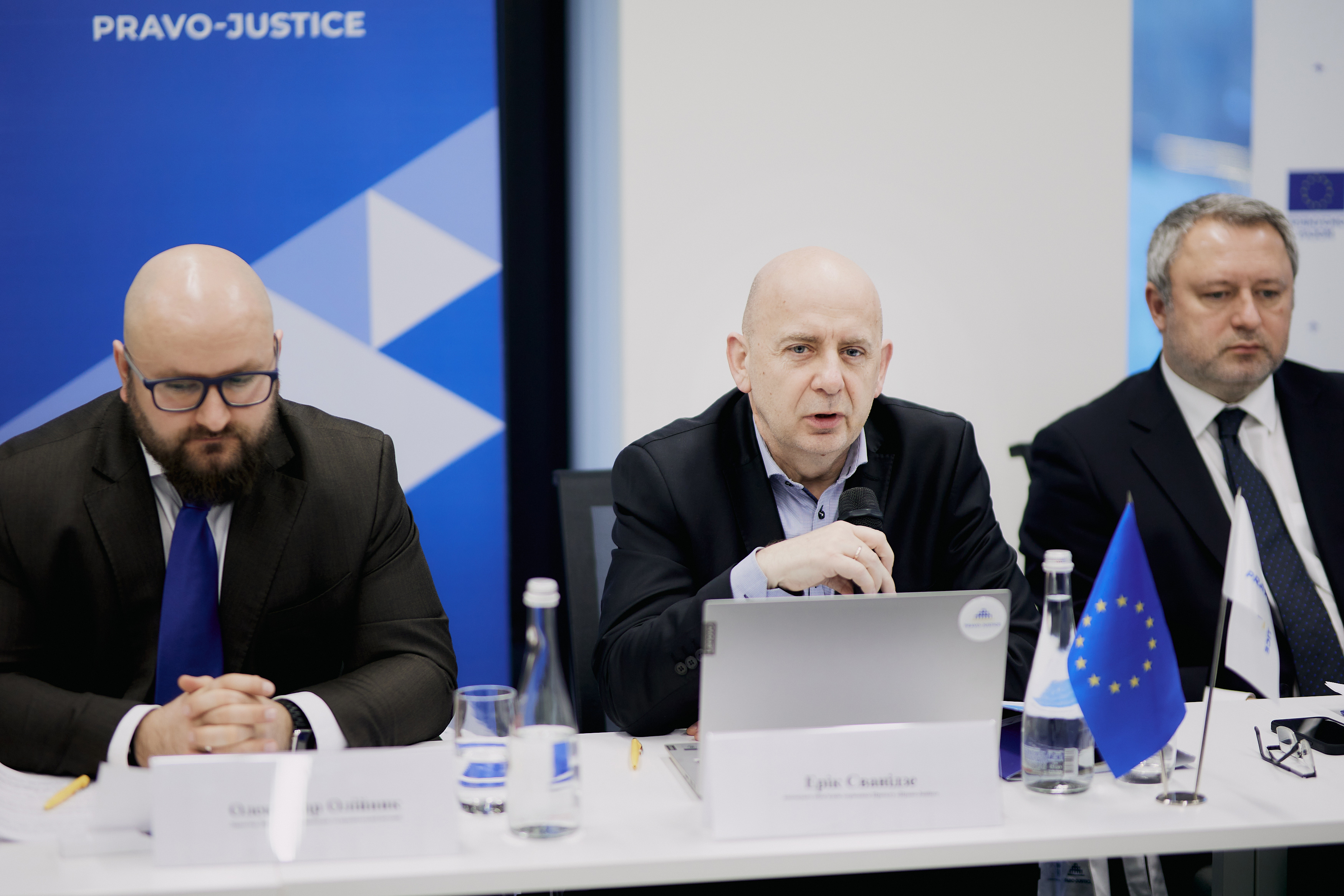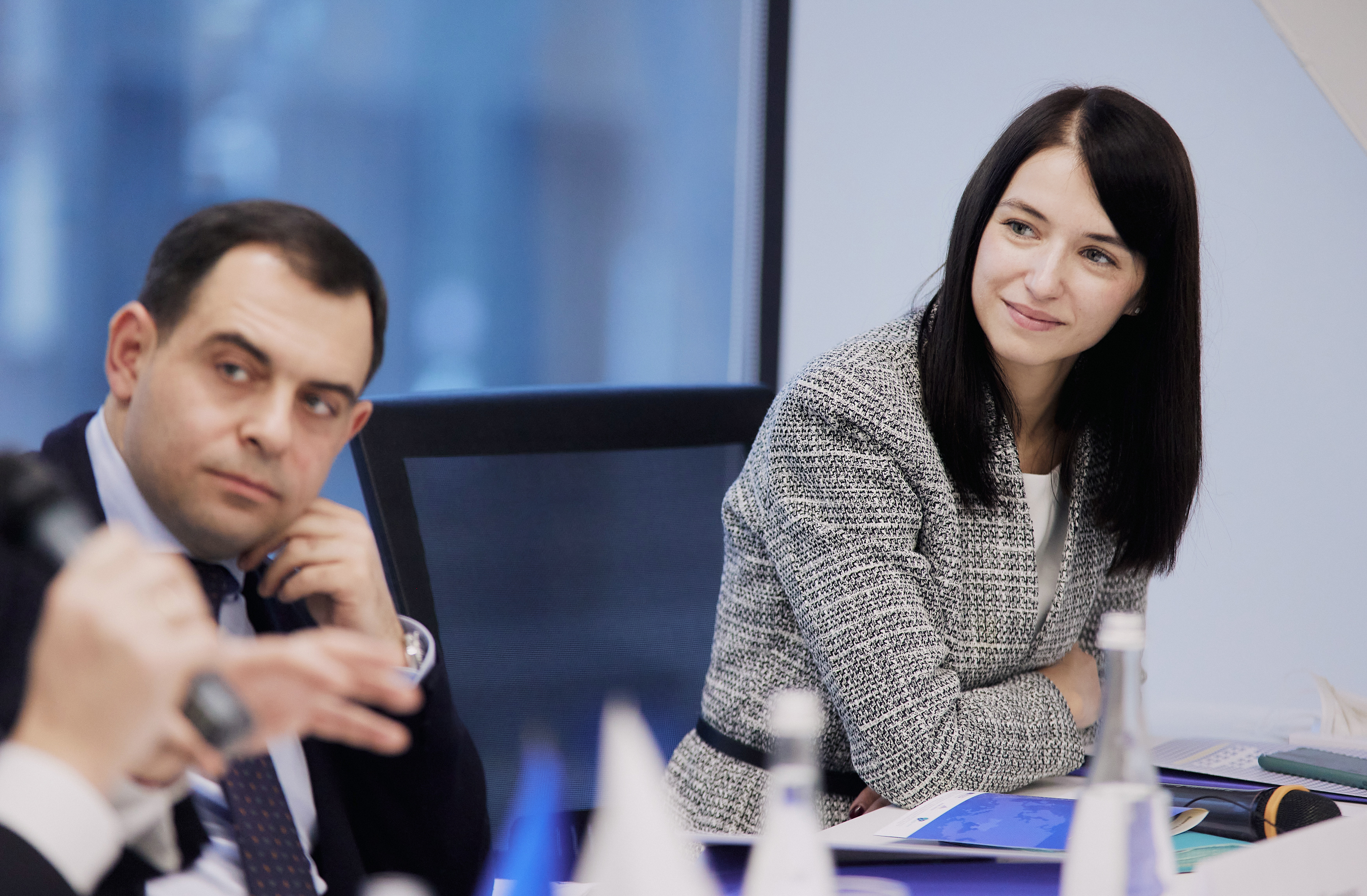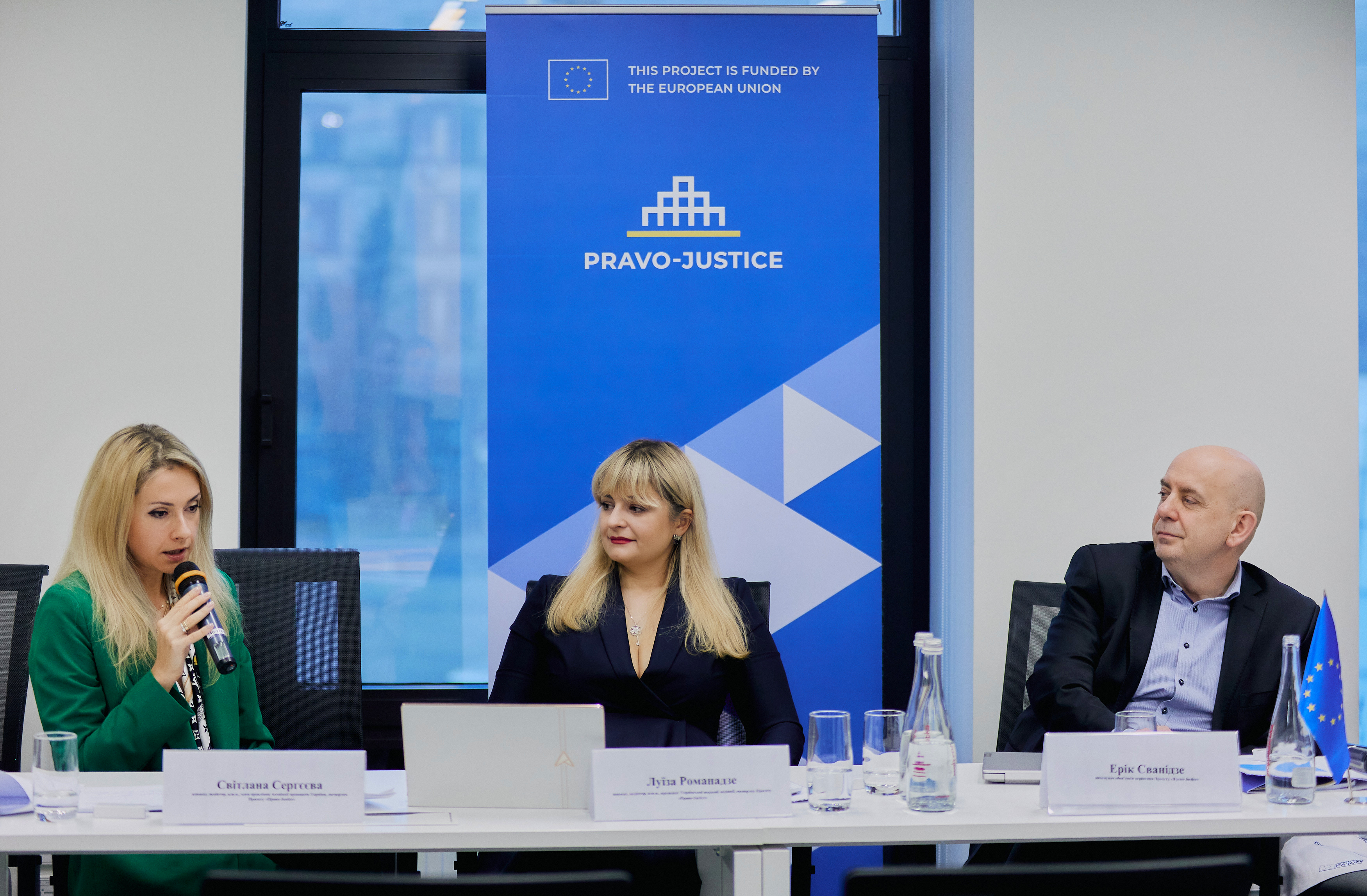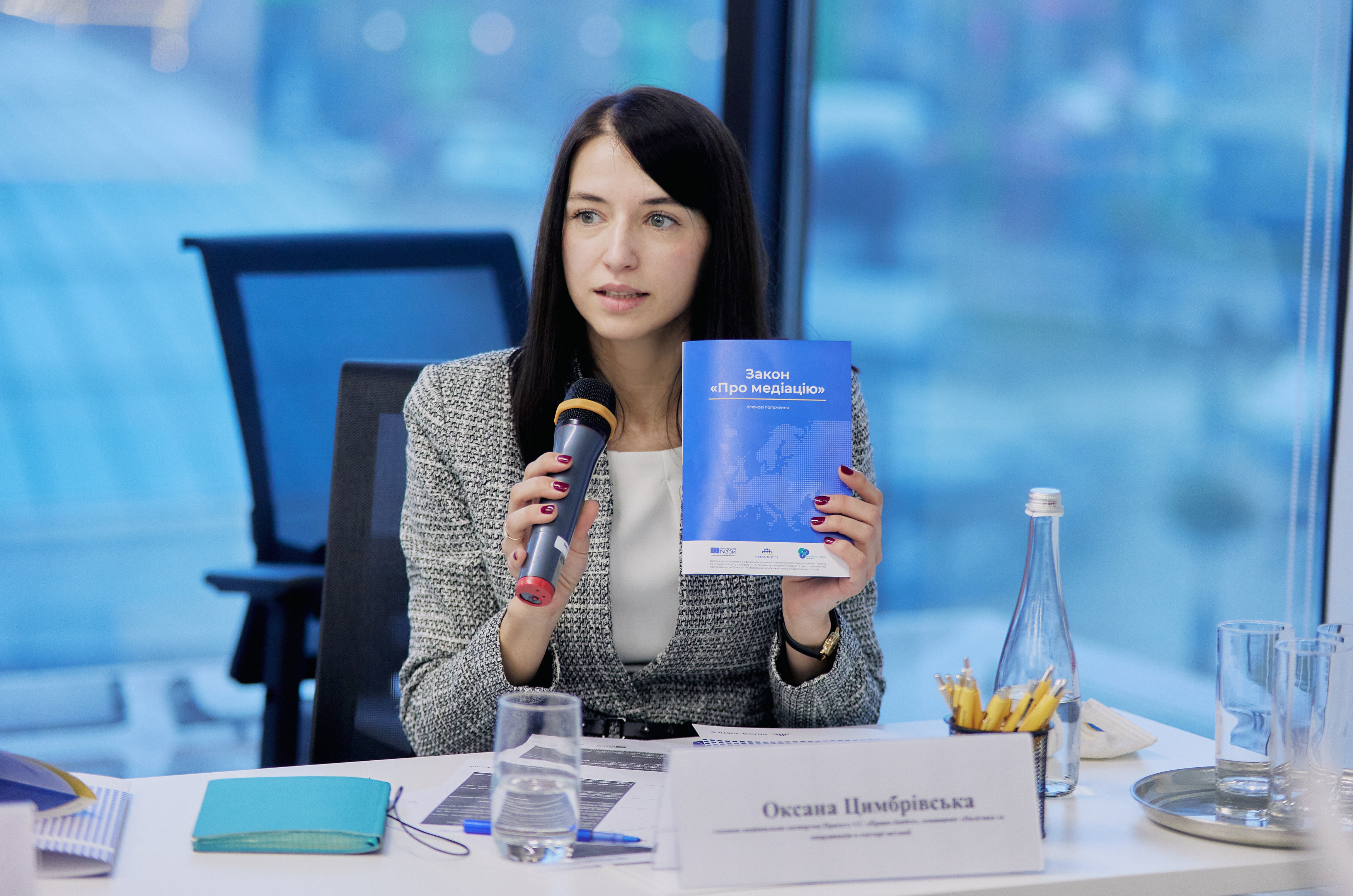Experts: Mediation is an effective alternative to litigation
On December 9, the EU Project "Pravo-Justice" held a press breakfast "The Law on Mediation adopted. How to implement it effectively?" In course of the event, representatives of the Ministry of Justice of Ukraine, the Parliament, mediation community, legal and judiciary communities, EU Project experts together with legal and business media journalists discussed major provisions of the law adopted in November as well as requisite steps for its successful implementation.
"We thank all those who have exerted major intellectual, political and other efforts to have the Law on Mediation adopted. The Project, along with other donors, has provided technical assistance and facilitated drafting respective bill. We will continue supporting introduction and promotion of mediation so that people get to know about this dispute resolution option. Moreover, we will share best practices in this area. We will make every effort to make mediation work as an effective dispute resolution tool in Ukraine," said Eric Svanidze, Acting Team Leader of EU Project "Pravo-Justice".

The key feature of the Law is its framework nature. It defines basic concepts, mediation principles, parties' rights and obligations, contract requirements, etc.
According to the law, mediation is an extrajudicial voluntary, confidential, structured procedure in which the parties, through a mediator, try to prevent or resolve a conflict (dispute) via negotiations. At the same time, the mediator does not look for who to blame and does not render judgements in the case. Mediator is responsible for following the procedure and helping the parties find a solution acceptable to both of them.
"Mediation is an alternative way to resolve issues and not let them escalate into conflict as a result of which one party will always be dissatisfied with a court decision. Introducing mediation in Ukraine is about finding common ground and reducing conflicts in society. The main thing is that people start taking responsibility for their lives, and mediators will help them in this", emphasized Andrii Kostin, Chair of the Parliamentary Committee on Legal Policy.

According to Oleksandr Oliinyk, Director of the Directorate of Justice and Criminal Justice of the Ministry of Justice of Ukraine, one can find a mediator in the registers in the public domain on the Internet: "These will be people who, either at the time of the adoption of the Law, have already been appropriately trained or who will attend trainings afterwards. The training will consist of at least 90 hours of study, of which 45 hours will be dedicated to practical training. After that, the person will receive a certificate and will have the right to mediate."
Mediation can be used in a variety of disputes, from divorce and division of property to appeals against dismissal, disputes between business and the state. Moreover, conciliation through mediation is possible before going to court, during court proceedings and even during the enforcement of a court decision.
Among key advantages of this very dispute settlement procedure:
- saving time and money;
- less emotional toll;
- it is possible to maintain good relationships;
- finding a solution focused on the interests and needs of all parties;
- high probability of voluntary implementation of arrangements;
- avoiding the stress related to litigation.
Moreover, the law introduces an incentive for pre-trial conciliation - if the parties reach an agreement through mediation, 60% of the court fee is refunded.

"The crucial task of all legal institutions is to build the rule of law. We should not determine who is more important. We need to focus on goals together. I have no doubt that an independent judiciary providing effective protection will only help make this market and this law work," mentioned Kostiantyn Kharakoz, judge-speaker of the Commercial Court of Donetsk Region, Member of the Donbas Regional Justice Reform Council.
Using mediation is also feasible in criminal cases to reconcile the victim and the suspect (charged). According to Nadiia Stefaniv, judge of the Criminal Cassation Court in the Supreme Court, this requires a number of changes to the Criminal Procedure Code, in particular: to determine a mediator as a participant in the proceedings, to supplement extenuating circumstances by adding wish and attempt of the parties to reconcile.
"It must be a team effort. The court, the mediator, the lawyer and the prosecutor must work together. It has to do with both pre-trial investigation and court proceedings, especially in first instance courts so that at this level we can use the mediation procedure as much as possible and close the proceedings," said Nadiia Stefaniv.
The Institute of Mediation has existed for almost 30 years in Ukraine. However, for the first time, the status of a mediator is defined by law.
"Governing basic principles of mediation, requirements for the mediator, the rights and responsibilities of the mediator and the parties to the mediation at the legislative level is an important benchmark for both mediators and consumers of this service. At the same time, the framework nature of the law requires action on the part of mediation community which should take responsibility for drafting policies, standards, accreditation procedures and other guidelines in mediator's activities," said Luiza Romanadze, advocate, mediator, Ph.D in Law, President of the Ukrainian Academy of Mediation, "Pravo-Justice Project" expert.

By making use of mediation, business disputes can be resolved faster and cheaper. It helps to avoid lengthy and exhausting lawsuits, maintain partnerships and ensure confidentiality.
“Mediation expands opportunities for constructive and fast conflict resolution. It opens new horizons for developing business partnerships. It is also important to debunk the myth that mediators are advocates' competitors. In fact, these are new opportunities for collaboration between advocates and mediators to achieve the best outcome for the parties to the conflict," said Svitlana Serhieieva, advocate, mediator, Ukrainian Bar Association board member, "Pravo-Justice" Project expert.
On the one hand, the framework nature of the law prevents over-regulation of mediation and encourages its development. On the other hand, lawyers, businesses, authorities and ordinary citizens may have questions: what do certain provisions mean? And: how to implement them in practice? To address these questions, EU Project "Pravo-Justice" together with the legislator and representatives of the working group of the Ministry of Justice of Ukraine which worked on the draft law will prepare an explanatory article-by-article commentary on the law. It will be written in plain language and aimed at a wide audience.

"In the implementation of the Law on Mediation, it is important to ensure smooth coordination of all stakeholders, such as the mediation community, lawyers, judges, government officials, the donor community. Given that the law is a framework one, it would be valuable to prepare an article-by-article commentary that would clarify the essence and rationale behind provisions of the law. It would be a useful source of information for lawyers, civil servants and ordinary citizens. EU Project "Pravo-Justice" is willing to support and coordinate its drafting," told Oksana Tsymbrivska, Key National Expert of EU Project "Pravo-Justice", Justice Sector Policy and Coordination Component.
Moreover, within the framework of EU Project it is planned to set up mediation IT system that will help the parties to the dispute to find a mediator, leave feedback as to the quality of his/her services, and it will be helpful to mediators themselves to effectively process cases.
This event is a follow-up of discussions on the use of mediation in administrative, commercial and civil proceedings, as well as in-depth analysis of legislative and institutional gaps in the implementation of mediation in Ukraine in various areas of law carried out by Pravo-Justice Project in 2020-2021. Based on the results of this research, the Project drew up reports on the categories of cases in administrative, civil and commercial litigation in which it is advisable to use alternative dispute resolution.
You can learn more about the key provisions of the Law on Mediation from infographics prepared with the financial support of the European Union in the framework of EU Project "Pravo-Justice" in cooperation with Ukrainian Academy of Mediation.
Background:
The Verkhovna Rada adopted the Law on Mediation on November 16, 2021, after almost 12 years of attempts to govern mediation.
EU Project "Pravo-Justice" supports justice sector reforms in Ukraine. The project partners include the High Council of Justice, the Ministry of Justice, the High Qualification Commission of Judges, the Supreme Court, the Council of Judges, the Notary Chamber and other justice sector institutions. The Project is implemented by Expertise France with European Union funding.